The bright red face of a Muscovy duck is hard to miss, but do these animals make good domesticated birds? Let’s look at how raising Muscovy ducks compares to raising chickens, especially when it comes to egg production and care requirements.
Muscovy Duck Overview
Before we look into the details of the Muscovy duck, here is some general information about the breed.
| Lifespan | 8 – 12 years |
| Weight | 6 – 15 pounds |
| Appearance | Black and white feathers with red facial “mask” |
| Egg Production | 60 – 120 eggs per year |
| Egg Color | White |
| Good for Beginners? | Sometimes |
| Price | $10 to $25 per duck |
Muscovy Duck History
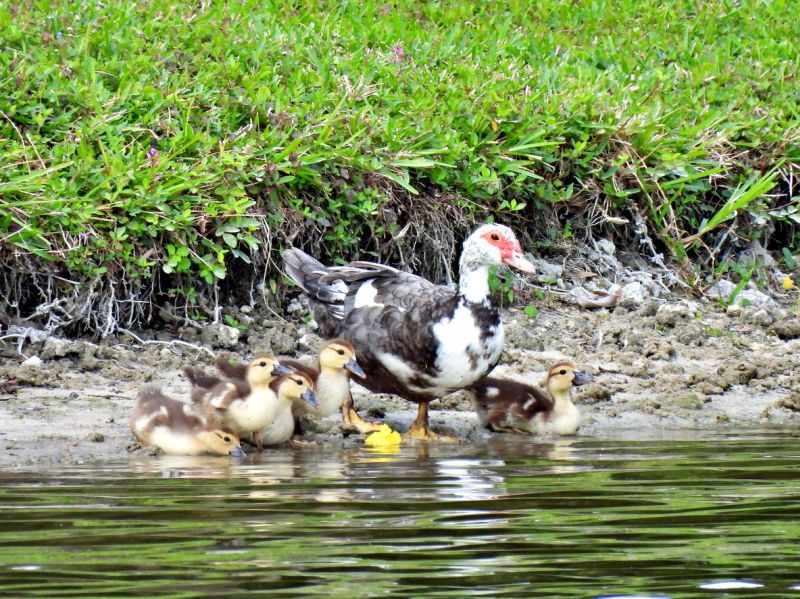
Muscovy ducks, also known as the “Forest Duck” or “Greater Wood Duck,” are native to Mexico, Central America, and South America. In the 1400s, some of these ducks were domesticated and bred for food.
Even though these ducks have been around in the wild and in captivity for centuries, they weren’t officially cataloged until 1758. Even though they’re called ducks, some believe that they’re just as closely related to geese as they are to ducks. Today, they are most commonly used for meat in captivity.
Muscovy Duck Habitat
In the wild, Muscovy ducks inhabit a wide variety of habitats, but they mostly reside in forests. When they breed, they go to wetlands, lagoons, swamps, or marshes. They are most likely to nest in trees near freshwater wetlands.
So, they thrive best in an area with dense vegetation because it gives them lots of places to hide and take shelter.
Muscovy Duck Appearance
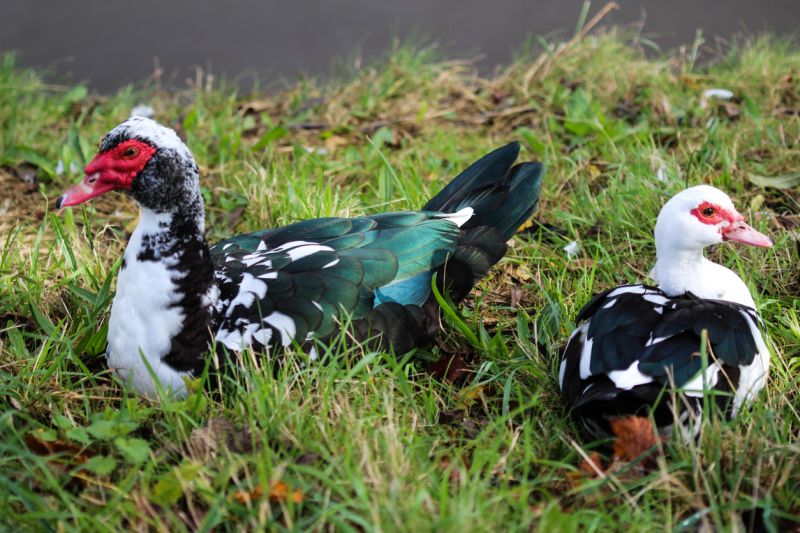
Muscovy ducks have a unique appearance that’s hard to miss. They have a mix of white and black feathers, along with red caruncles covering their face like a mask. Their feather colors can sometimes vary, including patterns with colors like brown, green, blue, and bronze.
These birds have webbed feet with long claws, but they’re not the best at swimming. However, they have yellow-brown eyes that excel at seeing things underwater.
Males are much larger than the females. They also usually have brighter feathers that seem to shimmer in the sunlight while females have duller feathers. Male Muscovy ducks will develop caruncles on their faces before the females do.
All the ducks have a crest of feathers on their head that stands up when they’re excited or nervous. Males also raise those feathers when they’re trying to attract a mate.
Egg Color
Muscovy ducks lay large white eggs. Their annual egg production is lower than the average duck, which is why this breed is commonly used for meat instead of eggs.
Size and Weight
These birds are large in comparison to other ducks. Males can weigh up to 15 pounds, but females are a little smaller at 6 to 7 pounds. Their wingspan can reach 64 inches.
Males are usually too heavy to fly, but females can fly well. So, you might need to clip their wings if kept in captivity.
Muscovy Duck Temperament
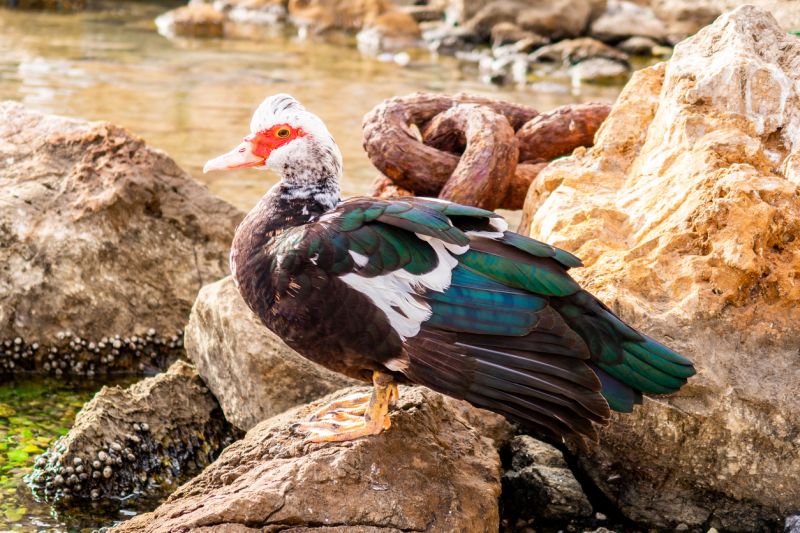
Every Muscovy duck seems to have their own personality, but there are some consistencies between them. They’re often described as calm and friendly. They might eagerly approach humans in hopes of getting food, but they prefer not to be handled.
Even though Muscovy ducks can behave well around people and other animals, they can have aggressive behaviors too. They don’t defend territories, but they might attack other ducks throughout the year, especially when females are nesting.
Luckily, these aggressive behaviors lessen in captivity. In the wild, the ducks usually spend time in pairs, but they are less wary of strangers when domesticated. While they don’t normally spend time in large groups, the ducks will often have more than one mate.
Are Muscovy Ducks Loud?
For the most part, Muscovy ducks are very quiet. They rarely speak up unless they feel threatened or excited. Yet, they don’t make traditional quacking sounds. Females make soft, trilling sounds while males have deep, hushed vocalization.
These ducks are known for wagging their tails like dogs, which can mean they’re either happy, excited, or upset. Males may also hiss or puff out their feathers if provoked.
Muscovy Duck Care Requirements
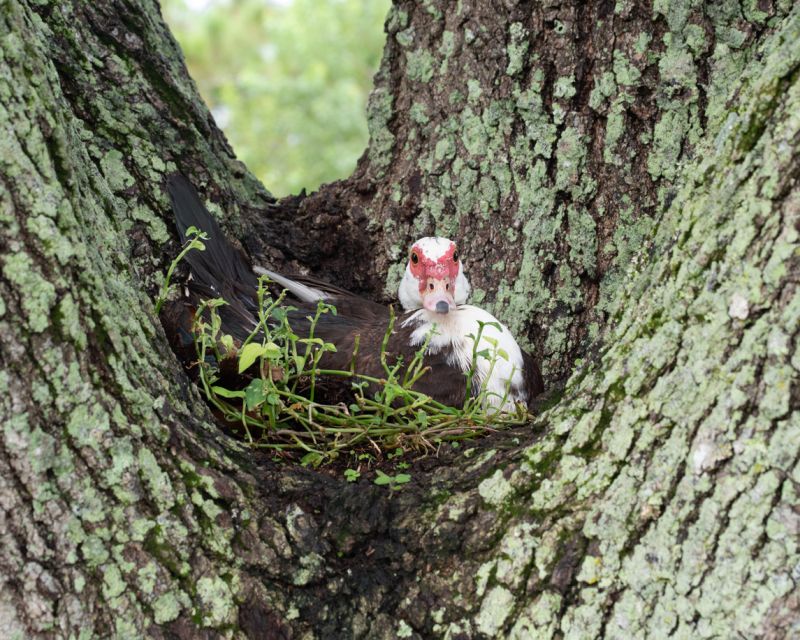
Muscovy ducks aren’t too hard to care for. They can be good for beginners, as long as you do your research before taking them in. Here are some tips to set up the ideal space for this breed.
Diet and Nutrition
Since the Muscovy duck is known for living in dense vegetation, they love a wide range of healthy foods. They like to forage for items like plants, leaves, roots, bugs, crustaceans, small fish, and even small reptiles. Letting them free-range is the best way to give them all the nutrients they need. They’ll also serve as a great source of pest control.
Even when allowed to forage, these ducks will still need a feed to keep them healthy. As ducklings, you can supply them with a 28% game bird starter. Then, as they grow into adults, you can slowly transition them to a 20% layer feed.
A combination of feed and items found while foraging will keep your ducks happy and content. You can also offer them treats, such as mealworms, cracked corn, and fresh greens.
Setting Up Space
Muscovy ducks don’t like to be confined to small spaces, so make sure your duck enclosure has lots of room and plenty of things for ducks to look at. If possible, give them lots of free-range time to help them gather essential nutrients and eliminate pests.
The ideal habitat for a Muscovy duck should include trees, wetlands, and water. As long as they have a nice pond and some dense vegetation to hide in, they’ll thrive. Providing tree-like shelter and nesting boxes will help encourage the female ducks to lay eggs.
Even though they like to be near water, you’ll notice that they don’t swim as much as most ducks. They have small oil-producing glands, which are used to make them waterproof. Yet, those glands aren’t as developed as they are for similar breeds, which is why Muscovy ducks don’t swim much.
Temperature
These ducks have long been tropical birds, but over time, they’ve adapted to survive various weather conditions. So, they thrive best in warm climates, but they can also handle temperatures as low as 10 degrees Fahrenheit.
To help your ducks survive cold winters, provide them with plenty of shelter and invest in coop heaters if needed. Make sure they have lots of shade in the summer too, but being near water is another great way for them to cool off.
Breeding Muscovy Ducks
By keeping male and female ducks in the same space, the ducks will breed to produce ducklings. Male Muscovy ducks mature at about 29 weeks old while females reach sexual maturity at 28 weeks old.
Mating season for this breed lasts from August to May. These birds don’t have much of a courtship dance. It usually consists of them wagging their tails and raising their crest feathers. Ducks don’t stay with one mate, but males might help protect eggs with the female.
In the wild, females like to nest in trees, so it’s best to supply them with nesting boxes that are raised above the ground.
Egg Production
Female Muscovy ducks only produce 60 to 120 eggs per year. Unlike chickens, they lay one clutch of eggs at a time rather than laying eggs several times a week. Muscovy ducks usually lay eggs a few times a year, and each clutch will have about 16 eggs.
Fertilized Muscovy duck eggs take longer to incubate than chicken eggs. The female will incubate the eggs for 35 days, and then the ducklings will spend time near their mom for 10 to 12 weeks.
Common Health Problems for Muscovy Ducks
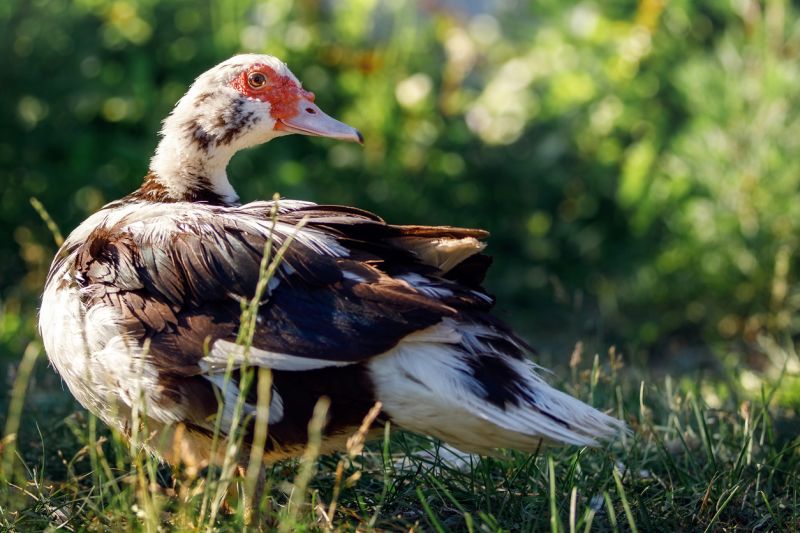
For the most part, these ducks are hardy birds with few common health problems. They usually live 8 to 12 years, but can live up to 20 years in captivity if well cared for.
The most common problem to look out for is frostbite. Muscovy ducks are more tolerant of warm weather than cold weather. So, make sure they have enough shelter in the winter to prevent that.
Like most birds, parasitic infections can also be a concern. Keeping their space clean, especially their food, water, and bedding, is a good way to prevent this. If you notice any unusual symptoms in your ducks, take them to the vet right away.
What Do People Keep Muscovy Ducks for?
While Muscovy ducks can be kept for eggs and pest control, their most common purpose is meat. Their meat is a much better quality than most ducks. Their meat is 98% fat-free and less greasy than similar breeds. It also has less calories and fat per pound than turkey.
Many people believe the Muscovy duck’s meat is more flavorful than most birds, but that will depend on how healthy your bird is and what you’re feeding them.
While Muscovy ducks don’t produce eggs anywhere near as rapidly as chickens, the eggs are common among pastry chefs. The eggs are large and make fluffier pastries. So, that’s why some people raise them for eggs instead.
Should You Consider Muscovy Ducks Over Chickens?
Chickens are great for people looking to raise meat and eggs, but ducks can have benefits over chickens in some cases. For Muscovy ducks, eggs that are great for pastries and better meat are two pros. Either of those aspects could be a reason to raise Muscovy ducks.
However, if you’re looking for a bird that can produce a lot of eggs in a short amount of time, a chicken might be better for you. It all depends on what you’re looking to gain from raising poultry.